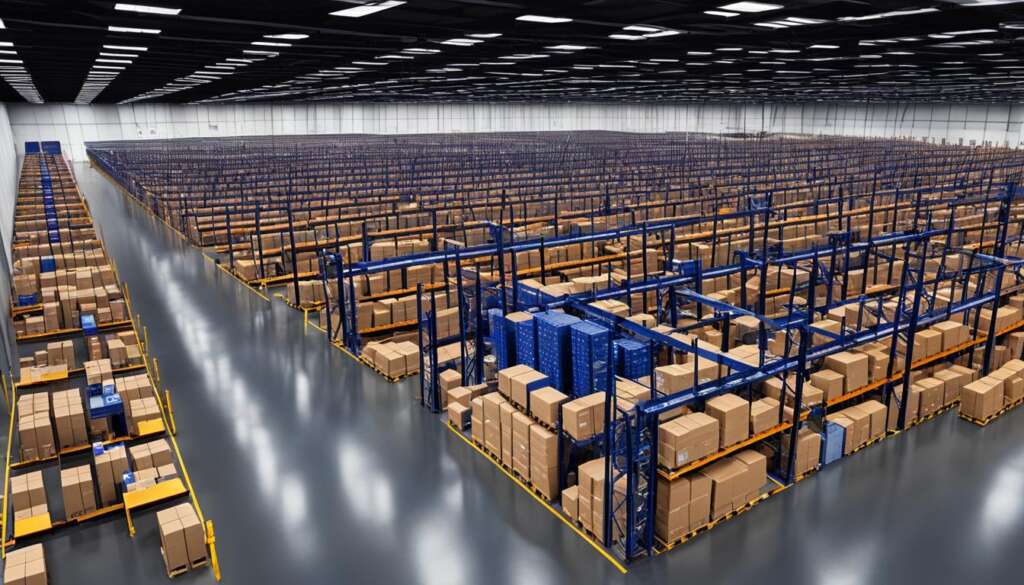Table of Contents
Integrated e-commerce platforms are revolutionizing the way businesses operate in the digital landscape. These platforms offer a seamless solution that combines multiple aspects of the e-commerce ecosystem into one cohesive system. From inventory management to order processing and customer support, integrated e-commerce platforms provide a comprehensive solution that streamlines operations and enhances efficiency.
So, what exactly are the benefits of integrated e-commerce platforms? Firstly, they provide complete visibility into product inventory levels, allowing businesses to accurately monitor stock and avoid stockouts or overstock situations. This not only ensures customer satisfaction but also optimizes inventory management.
Additionally, integrated e-commerce platforms offer streamlined delivery processes. By integrating with shipping providers and automating various shipping tasks, businesses can ensure faster and more efficient order fulfillment. This not only improves customer satisfaction but also reduces manual effort and human error in the fulfillment process.
Moreover, fully integrated e-commerce platforms eliminate the need for complex IT integrations. With pre-built connectors and APIs, these platforms can seamlessly communicate with other software and services in the IT ecosystem. This simplifies the setup process and reduces maintenance obligations, allowing businesses to focus on their core activities.
Lastly, integrated e-commerce platforms enhance customer experiences. By integrating with CRM platforms and marketing tools, businesses can personalize their communication, offer tailored recommendations, and create a cohesive shopping experience for their customers. This not only boosts customer engagement but also increases customer loyalty and repeat purchases.
In conclusion, fully integrated e-commerce platforms offer numerous benefits for businesses looking to optimize their online operations. From improved inventory management to streamlined delivery processes and enhanced customer experiences, these platforms provide a comprehensive solution that drives growth and success. Embracing the advantages of fully integrated e-commerce platforms can transform your business and empower you to thrive in the digital age.
What are Fully Integrated Ecommerce Platforms?
Fully integrated ecommerce platforms are e-commerce solutions that have built-in integrations with other software and services in the IT environment. These platforms eliminate the need for third-party connectors and come with pre-built connectors that enable them to communicate with other applications through an API. This removes the need for manual integration and allows for seamless communication and data transfer between different components of the IT ecosystem.
These platforms significantly simplify the process of connecting and synchronizing various software and services, making it easier for businesses to manage their e-commerce operations efficiently. With fully integrated ecommerce platforms, businesses can achieve a more streamlined and cohesive IT infrastructure, resulting in improved operational efficiency and enhanced customer experience.
By leveraging fully integrated ecommerce platforms, businesses can optimize their online operations and take advantage of the latest technologies without investing significant time and resources in developing custom integrations. These platforms provide a comprehensive solution that encompasses all the necessary integrations, ensuring a smooth workflow and eliminating the complexity associated with managing multiple disconnected systems.
The seamless integration capabilities of fully integrated ecommerce platforms enable businesses to automate processes, such as inventory management, order fulfillment, and customer support, creating a more efficient and cost-effective operation.
Through the elimination of manual processes and the automation of data transfer, businesses can reduce errors, improve data accuracy, and save valuable time and resources. This allows them to focus on more strategic aspects of their business, such as product development, marketing, and customer acquisition.
The Benefits of Fully Integrated Ecommerce Platforms:
- Streamlined operations and improved efficiency
- Enhanced customer experience
- Real-time data synchronization
- Reduced manual effort and human errors
- Scalability and flexibility for future growth
With these benefits in mind, it is clear why fully integrated ecommerce platforms have become a popular choice for businesses looking to optimize their online operations and deliver outstanding customer experiences.
| Benefits | Description |
|---|---|
| Streamlined operations and improved efficiency | Automated processes and seamless data transfer result in streamlined operations, reducing manual effort and improving overall efficiency. |
| Enhanced customer experience | Real-time data synchronization and streamlined order fulfillment processes contribute to an improved customer experience. |
| Real-time data synchronization | Full integration enables real-time data synchronization between different systems, ensuring up-to-date and accurate information. |
| Reduced manual effort and human errors | Automating processes eliminates manual data transfer and significantly reduces the risk of human errors. |
| Scalability and flexibility for future growth | Fully integrated ecommerce platforms offer the scalability and flexibility needed to adapt to changing business needs and support future growth. |
What are the Integrations for Fully Integrated Ecommerce Platforms?
Fully integrated ecommerce platforms have the capability to integrate seamlessly with a wide range of software and services. These integrations play a crucial role in optimizing operations, automating tasks, and improving the overall customer experience. Let’s explore some of the popular connectors and integrations for fully integrated ecommerce platforms:
ERP Systems
Enterprise Resource Planning (ERP) systems are one of the key integrations for fully integrated ecommerce platforms. By connecting the ecommerce platform with an ERP system, businesses can manage and synchronize their inventory, orders, and financial data in real-time. This integration streamlines operations, improves accuracy, and enables efficient resource planning.
CRM Platforms
Customer Relationship Management (CRM) platforms are another important integration for fully integrated ecommerce platforms. By integrating the ecommerce platform with a CRM system, businesses can centralize customer data, track interactions, and create personalized marketing campaigns. This integration enhances customer engagement, fosters long-term customer relationships, and drives revenue growth.
Payment Gateways
Integrating fully integrated ecommerce platforms with popular payment gateways enables seamless and secure payment processing. These integrations ensure that customers can conveniently make purchases and businesses can accept a wide range of payment options. The integration with payment gateways enhances the checkout experience, increases customer trust, and minimizes payment processing errors.
Content Management Systems
Content Management Systems (CMS) integrations allow businesses to efficiently manage their website content, product catalogs, and promotional materials. By integrating the ecommerce platform with a CMS, businesses can easily update product information, create engaging content, and deliver a seamless user experience. This integration streamlines content management processes and ensures consistent branding and messaging across different platforms.
Marketing Tools
Fully integrated ecommerce platforms can integrate with various marketing tools to automate marketing campaigns, track customer behavior, and analyze data. These integrations enable businesses to target the right audience, personalize marketing messages, and measure the success of their marketing efforts. By integrating marketing tools, businesses can optimize their marketing strategies and drive valuable customer engagement.
Customer Support Software
Integrating customer support software with fully integrated ecommerce platforms allows businesses to provide exceptional customer service. These integrations enable seamless communication between the ecommerce platform and customer support channels, such as ticketing systems or live chat tools. By integrating customer support software, businesses can efficiently manage customer inquiries, resolve issues promptly, and enhance customer satisfaction.
Inventory Management Software
Integrations with inventory management software enable businesses to accurately track stock levels, manage suppliers, and streamline order fulfillment processes. By integrating the ecommerce platform with inventory management software, businesses can automate inventory updates, prevent overselling, and improve order accuracy. This integration optimizes inventory management, reduces fulfillment errors, and enhances operational efficiency.
In summary, integrations for fully integrated ecommerce platforms encompass a wide range of software and services, such as ERP systems, CRM platforms, payment gateways, content management systems, marketing tools, customer support software, and inventory management software. These integrations enable businesses to automate tasks, optimize operations, and deliver exceptional customer experiences. By leveraging the power of integrations, businesses can unlock the full potential of their ecommerce platforms and drive success in the digital marketplace.
5 Benefits of Fully Integrated Ecommerce Platforms
Fully integrated ecommerce platforms offer numerous advantages that can significantly improve business operations and customer experience. Here are five key benefits of implementing a fully integrated ecommerce platform:
- Real-time inventory management: With a fully integrated ecommerce platform, businesses can update product inventory levels in real-time. This ensures accurate information is available to customers, reducing the risk of disappointing customers at checkout due to out-of-stock items. Real-time inventory management enables businesses to provide a seamless customer experience by ensuring product availability and avoiding potential backorders or cancellations.
- Faster and streamlined delivery processes: Integrated ecommerce platforms allow businesses to automate and streamline their delivery processes. By connecting the ecommerce platform with logistics and shipping providers, businesses can quickly process orders, generate shipping labels, and provide customers with real-time tracking updates. This leads to faster order fulfillment and improved customer satisfaction.
- Easier maintenance: Fully integrated ecommerce platforms eliminate the need for manual IT integrations. These platforms come with pre-built connectors that facilitate seamless communication between different software and services in the IT environment. As a result, businesses can easily add or update integrations without the hassle of intensive coding or manual configurations, reducing maintenance obligations and IT costs.
- Less manual effort: Integrated ecommerce platforms automate data transfer and information exchange between different systems, reducing the need for manual intervention. This saves time and effort by minimizing the manual input of data and eliminates the risk of errors that can occur during manual data transfers. By streamlining processes and reducing manual effort, businesses can allocate resources to more strategic activities and improve productivity.
- Improved data visibility: A fully integrated ecommerce platform provides businesses with comprehensive visibility into their data. By integrating various systems such as CRM, ERP, and order management, businesses can access real-time information on sales, inventory levels, customer behavior, and more. This enhanced data visibility enables businesses to make informed decisions, identify trends, and optimize their operations for better performance.
In summary, fully integrated ecommerce platforms offer several benefits, including real-time inventory management, faster and streamlined delivery processes, easier maintenance, less manual effort, and improved data visibility. By leveraging these advantages, businesses can enhance their operations, provide a better customer experience, and achieve greater efficiency.

Comparison of Fully Integrated Ecommerce Platforms
| Benefits | Fully Integrated Ecommerce Platforms | Non-Integrated Ecommerce Platforms |
|---|---|---|
| Real-time inventory management | ✅ | ❌ |
| Faster and streamlined delivery processes | ✅ | ❌ |
| Easier maintenance | ✅ | ❌ |
| Less manual effort | ✅ | ❌ |
| Improved data visibility | ✅ | ❌ |
How Integrate.io Can Help with Fully Integrated Ecommerce Platforms
Integrate.io, a prominent provider of fully integrated ecommerce platforms, offers a comprehensive solution to help businesses streamline their operations and enhance their online presence. With a seamless integration capability and pre-built connectors, Integrate.io enables businesses to effortlessly connect their ecommerce platforms with other software and services within their IT environment.
By leveraging Integrate.io’s expertise and support, businesses can achieve a fully integrated ecommerce ecosystem that optimizes their processes and maximizes efficiency. By entrusting the IT integrations to the experts at Integrate.io, businesses can concentrate on their core activities and growth strategies without diverting valuable resources.
Integrate.io’s fully integrated ecommerce platforms offer a range of benefits including:
- Real-time inventory management
- Streamlined order processing and fulfillment
- Improved data visibility
- Enhanced customer experience
- Efficient maintenance and support
With Integrate.io, businesses can expect a user-friendly interface, reliable performance, and continuous maintenance and support to ensure smooth operations of their fully integrated ecommerce platforms.
Effortless Integrations
Integrate.io enables businesses to seamlessly connect their ecommerce platforms with various software and services in their IT ecosystem. With pre-built connectors, businesses can integrate their ecommerce platforms with:
- ERP systems
- CRM platforms
- Payment gateways
- Content management systems
- Marketing tools
- Customer support software
- Inventory management software
This enables businesses to automate tasks, improve operational efficiency, and enhance the overall customer experience.
Types of ERP for Integrated Ecommerce Platforms
In the world of ecommerce, integrating an ERP system with your platform can bring significant benefits to your business. When it comes to ERP systems, there are two main types that can be integrated with ecommerce platforms: real-time and non-real-time.
Real-Time ERP Systems
A real-time ERP system is constantly connected to the database, enabling fast and immediate data exchange. It provides businesses with instant access to accurate and up-to-date information. With a real-time ERP system, data synchronization happens in real-time, ensuring that all systems have the most recent information available. This type of integration facilitates efficient and timely decision-making across different departments, such as inventory management, order processing, and customer support.
Non-Real-Time ERP Systems
In contrast, a non-real-time ERP system connects to the database periodically and may have slower response times. Data exchange is not instantaneous, and there might be a delay between updates. While this type of integration may not offer the same level of immediacy as real-time systems, it can still provide businesses with valuable insights and streamline key processes.
When connecting an ERP system to an ecommerce platform, businesses need to consider the compatibility and capabilities of their ERP system. It is important to choose a system that aligns with your business requirements and can efficiently exchange data with your ecommerce platform to ensure smooth operations and effective decision-making.
| Type of ERP System | Key Features |
|---|---|
| Real-Time | – Constantly connected to the database – Fast data exchange – Real-time synchronization – Timely decision-making |
| Non-Real-Time | – Periodic connection to the database – Slower response times – Delayed data updates – Streamlined processes |

Integrating the right type of ERP system with your ecommerce platform can empower your business with accurate data, efficient processes, and improved decision-making capabilities.
Benefits of B2B Ecommerce ERP Integration
Integrating ERP systems with B2B ecommerce platforms offers several advantages for businesses. This integration enables smoother operations, improved customer experience, and increased efficiency. Let’s explore the key benefits of B2B ecommerce ERP integration:
- Improved Inventory Management: By integrating ERP systems with B2B ecommerce platforms, businesses can achieve better inventory control. Real-time data synchronization helps maintain accurate inventory levels, reducing overselling and out-of-stock situations. This ensures that businesses can fulfill customer orders promptly, leading to increased customer satisfaction and retention.
- Streamlined Order Processing and Fulfillment: ERP integration automates the order processing and fulfillment processes. Orders received through the B2B ecommerce platform flow seamlessly into the ERP system, eliminating the need for manual data entry. This results in faster and error-free processing, ensuring timely order fulfillment.
- Accurate Financial Reporting: Integrating ERP systems with the B2B ecommerce platform ensures accurate financial reporting. The integration streamlines the flow of order and payment data, allowing businesses to generate comprehensive financial reports effortlessly. This enhances financial visibility, aiding in better decision-making and enabling businesses to adapt to changing market conditions.
- Enhanced Customer Experience: B2B ecommerce ERP integration enables a seamless customer experience. With real-time inventory visibility, businesses can provide accurate product availability information to customers. Integration also allows customers to access order status updates and tracking information, enhancing transparency and improving overall satisfaction.
- Increased Efficiency: Integrating ERP systems with B2B ecommerce platforms reduces manual effort and improves efficiency. By automating tasks such as order processing, inventory updates, and invoicing, businesses can allocate resources more effectively and focus on strategic activities. This leads to improved productivity and cost savings.
Overall, B2B ecommerce ERP integration offers numerous benefits, including improved inventory management, streamlined order processing and fulfillment, accurate financial reporting, enhanced customer experience, and increased efficiency. Integration facilitates seamless data exchange between systems, empowering businesses to operate at peak performance.
Conclusion
Integrated ecommerce platforms offer numerous benefits for businesses, such as improved operational efficiency, enhanced customer experience, and streamlined processes. By integrating their ecommerce platform with other software and services, businesses can automate tasks, improve data visibility, and optimize their operations.
The choice to use fully integrated ecommerce platforms can simplify IT integrations and allow businesses to focus on core activities and growth strategies. With the right provider, businesses can achieve seamless integration and maximize the benefits of integrated ecommerce platforms. These platforms eliminate the need for manual IT integrations and come with pre-built connectors that enable them to communicate with other software and services in the IT environment.
By leveraging fully integrated ecommerce platforms, businesses can gain complete visibility into product inventory levels, streamline their delivery processes, reduce maintenance obligations, and provide stronger customer experiences. The ease of use and simplicity of these platforms cut down on the complexity of the IT ecosystem, freeing businesses to concentrate on driving their success.
FAQ
What are fully integrated ecommerce platforms?
Fully integrated ecommerce platforms are e-commerce solutions that have built-in integrations with other software and services in the IT environment. These platforms eliminate the need for third-party connectors and come with pre-built connectors that enable them to communicate with other applications through an API. This removes the need for manual integration and allows for seamless communication and data transfer between different components of the IT ecosystem.
What are the integrations for fully integrated ecommerce platforms?
Fully integrated ecommerce platforms can integrate with various software and services, such as ERP systems, CRM platforms, payment gateways, content management systems, marketing tools, customer support software, and inventory management software. These integrations enable businesses to automate tasks related to order management, inventory management, customer relationship management, payment processing, content management, marketing, and customer support. By integrating these different components, businesses can gain efficiencies, optimize operations, and improve the overall customer experience.
What are the benefits of fully integrated ecommerce platforms?
Fully integrated ecommerce platforms offer several benefits, including real-time inventory management, faster and streamlined delivery processes, easier maintenance, less manual effort, and improved data visibility. By updating product inventory levels in real-time, businesses can avoid disappointing customers at checkout and provide a better customer experience. Streamlined delivery processes and real-time visibility into order status can enhance the customer experience and reduce the need for customer support. With integrated systems, businesses can minimize manual effort in transferring data between different platforms and improve operational efficiency.
How can Integrate.io help with fully integrated ecommerce platforms?
Integrate.io is a leading provider of fully integrated ecommerce platforms that can help businesses streamline their operations and improve their online presence. With pre-built connectors and seamless integration capabilities, businesses can easily connect their ecommerce platform with other software and services in their IT environment. Integrate.io offers comprehensive support and maintenance for their integrated ecommerce platforms, allowing businesses to focus on their core activities and leave the IT integrations to the experts.
What are the types of ERP for integrated ecommerce platforms?
There are two types of ERP systems that can be integrated with ecommerce platforms: real-time and non-real-time. Real-time systems are connected constantly to the database and enable fast data exchange, while non-real-time systems connect periodically and may have slower response times. Businesses need to consider the compatibility and capabilities of their ERP system when integrating it with their ecommerce platform to ensure smooth and efficient data exchange.
What are the benefits of B2B ecommerce ERP integration?
Integrating ERP systems with B2B ecommerce platforms offers several advantages, including improved inventory management, streamlined order processing and fulfillment, accurate financial reporting, enhanced customer experience, and increased efficiency. By automating manual tasks related to inventory management and order processing, businesses can reduce costs and improve operational efficiency. Accurate financial reporting and enhanced customer experience contribute to better decision-making and customer satisfaction, while increased efficiency helps businesses improve overall performance.
What are the benefits of integration for ecommerce platforms?
Integrated ecommerce platforms offer numerous benefits for businesses, such as improved operational efficiency, enhanced customer experience, and streamlined processes. By integrating their ecommerce platform with other software and services, businesses can automate tasks, improve data visibility, and optimize their operations. The choice to use fully integrated ecommerce platforms can simplify IT integrations and allow businesses to focus on core activities and growth strategies. With the right provider, businesses can achieve seamless integration and maximize the benefits of integrated ecommerce platforms.







